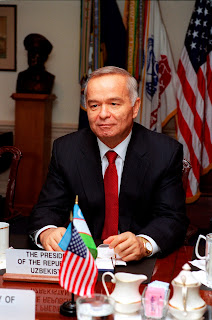Islam Abdug‘aniyevich Karimov (born January 30, 1938) is the first President of Uzbekistan, serving since 1990.
Early life and career
Karimov, placed in an orphanage in Samarkand at birth, grew up to study economics and engineering at school. He became an official in the Communist Party of the Soviet Union, becoming the party's First Secretary in Uzbekistan in 1989. On March 24, 1990 he became President of the Uzbek Soviet Socialist Republic. Karimov's election to the Uzbek Communist Party resulted after his predecessor Rafik Nishanov failed to quell inter-ethnic clashes and instability in the Fergana region. He declared Uzbekistan an independent nation on August 31, 1991 and subsequently won Uzbekistan's first presidential election on December 29, 1991, with 86% of the vote. The election was called[by whom?] unfair, with state-run propaganda and a falsified vote count, although the opposing candidate and leader of the Erk (Freedom) Party, Muhammad Salih, had a chance to participate. Karimov permitted the participation of the opposition organizations Birlik ("popular movement") and the Islamic Renaissance Party until his efforts to consolidate power over Shukrullo Mirsaidov, a former Communist Party elite who had originally supported Karimov's rise to the Party presidency. The period of political thaw was brief; Karimov began to complicate the registration process of opposition parties during elections. As Birlik grew in strength as a "popular movement", it was denied the ability to register as a "political party" without the required 60,000 signatures. The Karimov government allowed Birlik one day to gather these signatures, 25,000 of which they rejected. Karimov effectively took authoritarian measures to block any meaningful opposition.
Presidency
Uzbekistan under the Karimov government classifies as a hard authoritarian regime with little to no civil society promotion. The state's primary legitimacy claims are anti-Islamism and ethnic identity. Karimov's primary authoritarian measures that were implemented following the brief period of "thaw" and political tolerance include the thwarting of alternative political leaders from coalition building.
2005 Andijan Massacre
According to refugee detailed accounts, some 400 of the 500 killed were said to be driven deliberately into a trap -- authorities had blocked all the exits from Bobur Square with APCs, preventing people from dispersing home. Instead, they drove the crowd into a closed street, Chulpon Avenue, where snipers and police shot to kill. It was these scenes of deliberate killings that prompted eyewitnesses to allege that troops not only shot to disperse the demonstration, but to summarily execute anyone who took part in it. Later, some tortured detainees recounted that police said they had received orders supposedly emanating from the president himself to shoot to kill.
According to Ikrom Yakubov, a major in Uzbekistan's secret service who defected to Britain in 2007, the government "propped up" Akramia, which the Uzbek government blamed for fomenting the sparking the incident led to the protests. He believes that the attacks were incident was a pretext to repress dissenters. According to Yakubov, President Karimov personally ordered government troops to fire on the protestors.
Islam Karimov "placed blame for the unrest on Islamic extremist groups, a label that he has used to describe political opponents in recent years and that his critics say is used as a pretext for maintaining a repressive state." A press release from the government stated that "As a result of the clashes, 9 people died and 34 were injured".
Personal life
Karimov's wife, Tatyana Akbarovna Karimova, is an economist. They have two daughters and three grandchildren. His eldest daughter Gulnara Karimova, serves as an advisor for Uzbekistan's ambassador to Russia and is believed to have built an extensive business empire that includes the largest mobile phone operator in the country, night clubs and a large cement factory. Karimov's second daughter, Lola Karimova-Tillyaeva, is known in Uzbekistan for her role in promoting education and sports, as well as championing the rights of children. She is founder of major charity organizations in Uzbekistan - "You are not alone", Republican Social Children's Fund for helping orphans, and Republican Center for Social Adaptation of Children, mainly focusing at disabled children and those from vulnerable groups.
From : www.wikipedia.org


